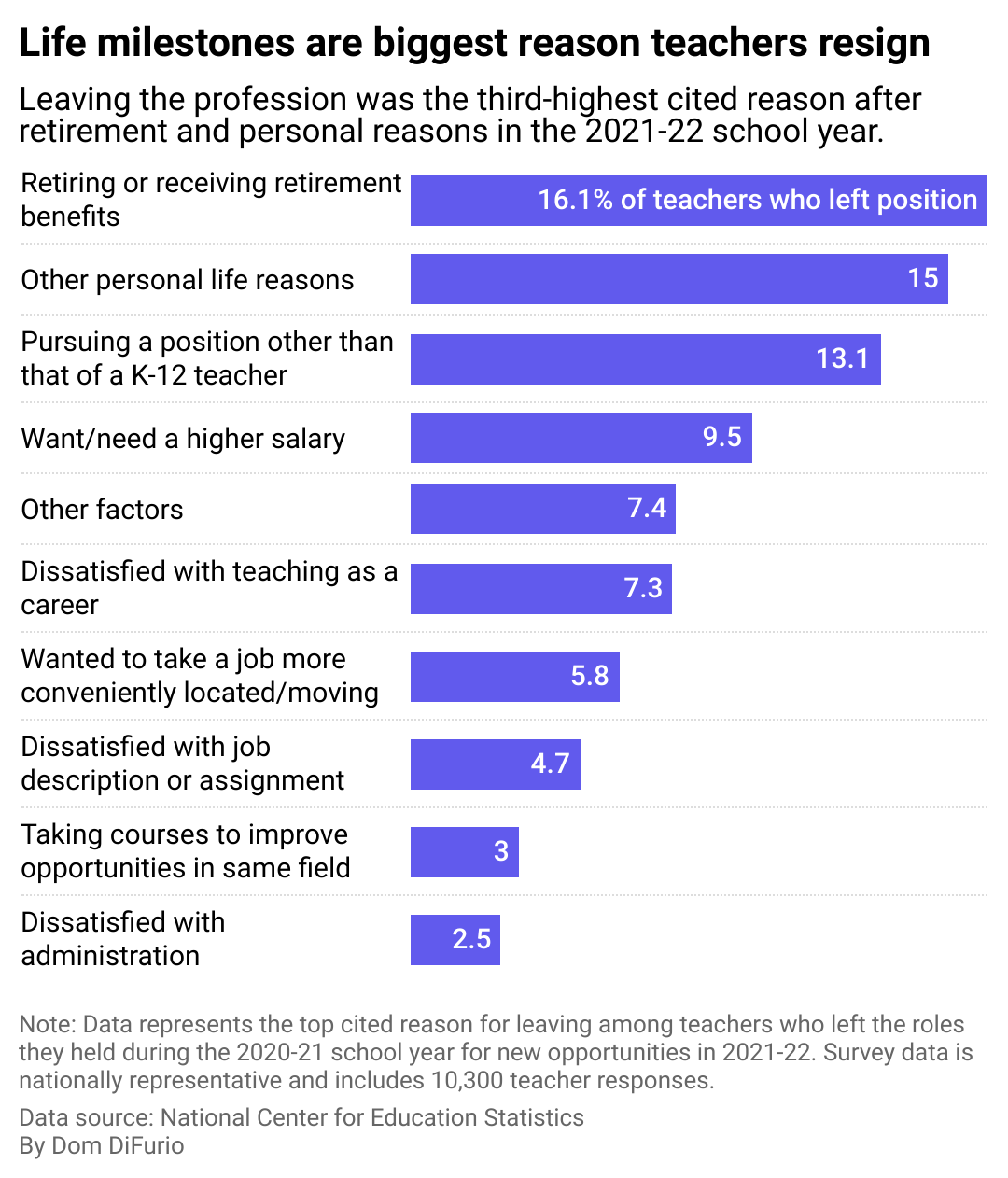The top reasons teachers give for leaving their jobs

Chiarascura // Shutterstock
The top reasons teachers give for leaving their jobs
Rear view of teacher walking down school hallway.
Classrooms around the U.S. are full of students again with the pandemic on the wane. But teachers? An estimated nearly 30,000 of them were absent from classrooms at the end of the the 2021-22 school year—a symptom of schools’ inability to keep teachers on payroll.
HeyTutor analyzed teacher attrition data from the National Center for Education Statistics to shed light on how teachers feel about leaving their jobs. The latest survey data available comes from the 2021-22 school year.
A modest amount of attrition is often seen as a natural part of doing business for any organization, but schools have been seeing teachers leave faster than they can recruit new ones in recent years. It’s a trend that threatens the quality of education for students, especially for schools serving students in low-income areas.
Attrition data for teachers is difficult to come by, and states report that info differently and to varying degrees. A Chalkbeat analysis of state attrition data found that states including Washington, Hawaii, Louisiana, Mississippi, Maryland, North Carolina, South Carolina, and Maine saw their highest teacher attrition rates in five years during the 2021-22 school year.
Teaching positions for math and science, as well as inclusive education, are some of the hardest to fill, impacting the most vulnerable students. Schools are also struggling to hire and retain bus drivers, classroom aides, and custodial staff.
Teachers describe burnout, lack of respect from upper management, unbearable workloads that stretch into weekends, and low pay. In 2022, a survey of 3 million professionals, including 130,000 teachers, researchers at the Johns Hopkins Bloomberg School of Public Health found that teachers experienced even more anxiety than health care workers during the pandemic.
While attrition rates increased, according to surveys of teachers who left their K-12 teaching jobs in the 2021-22 school year, retirement was the most commonly cited primary reason for leaving the classroom.
![]()

HeyTutor
Where are America’s teachers going?
Bar chart showing most likely reasons teachers leave their job, with retirement cited as the number one reason and leaving the profession coming in third.
After retirement, professionals leaving their teaching roles cited personal reasons— including caring for family, pregnancy/child care, and personal health—as their top motivating factor. Following closely behind life milestones were teachers who said they were seeking a position outside of teaching, as well as those who sought higher pay.
Some of the top reasons teachers jump may provide a framework for retaining more of them. While retirement is expected, departures to raise children or provide family care may speak to the overwhelming nature of classroom teaching jobs and the compounding stress placed on teachers when positions in their schools go unfilled for long periods.
The National Education Association, the largest labor union representing teachers, has recommended that school districts looking to improve retention implement mentoring programs, career progression opportunities, and openings for teachers to take on additional roles such as becoming coaching professionals for other teachers.
Of course, not all teachers leave their jobs to seek out noneducational work. Some of the turnover experienced in classrooms is a result of teachers shuffling around to school districts they’d prefer to live in, differences in leadership styles among school administrators, and other factors that occur naturally for some portion of workers in any field.
Story editing by Shannon Luders-Manuel. Copy editing by Robert Wickwire.
This story originally appeared on HeyTutor and was produced and
distributed in partnership with Stacker Studio.






